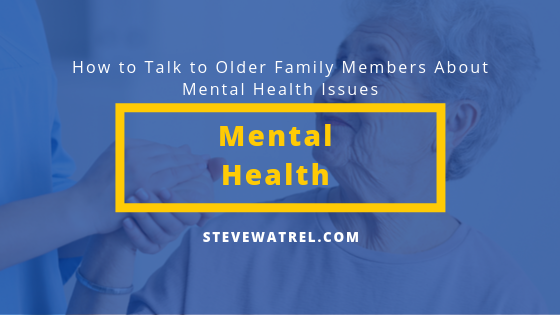Though the golden years are supposed to be a peaceful time in life, many older adults are dealing with issues like depression. Depression and suicide among older adults are a growing concern for caregivers and family members. Being aware of the symptoms and potential causes of depressive conditions can help you protect your older family members. It also helps to talk to older relatives to know how they’re feeling. Here’s some information that can help you talk to older family members about mental health issues.]
Depression is common among older adults, but it’s not a natural part of aging. According to the National Institute of Health, most seniors report being satisfied with life in their golden years. If a family member develops depression as they grow older, there may be something distinct causing these feelings. Talking to family members about these potential causes of depression can identify the root problem and possible solutions.
Older adults often deal with circumstances that can contribute to mental health issues. Problems related to illness, disability, pain management, cognitive decline, and a changing body image can all be factors that lead to depression. Talking to family members about their physical health can help them come to terms with their changing physical condition. It also allows family members to identify the health problems that are having the worst effect on an older relative’s quality of life.
Loneliness and isolation are also factors that contribute to mental health issues in older adults. Seniors can have a dwindling social circle as friends pass away or move to another location. Decreased mobility also makes it harder for seniors to visit old friends or to go to places where they can meet new people. One of the benefits of having seniors in a managed care facility is an opportunity for them to interact with people in their age group. In-home caregivers can also provide companionship for adults struggling with isolation and loneliness. For help choosing the right managed care option for your relatives, download the Caregiver’s Guide from Steve Watrel, P.A.
Though it’s your reward for a lifetime of hard work, retirement can be a trigger for depression. Work brings a sense of purpose that can be lost when someone retires, which affects their sense of identity, status, and self-confidence. Furthermore, moving to a fixed income can increase a senior’s financial. All of these factors are ways that retirement can increase the risk of depression. Family members can help seniors with these concerns by talking to them about things they can do during retirement, such as volunteering or joining a group in the local community.
Caregivers should also be aware of any events that could trigger depression. For example, the death of a spouse, close friends, relatives, and pets are common causes of depression in older adults. Offering a compassionate ear may be all the help an older adult needs to get past these traumatic events.
Another thing to keep in mind is that feelings of depressions can be the symptoms of certain health conditions. An excellent example of this can be seen in ischemia, a condition that causes restricted blood flow in older adults. This condition could be the cause of depression in older adults who experience depression for the first time later in life. When this happens to someone with no other family history of depression, this is called “vascular depression.”
There are many possible treatments for depression, but they all start with detecting the problem. By talking to older family members about the events in their lives and the concerns they have, it’s possible to identify the cause of depression. Nursing homes have a responsibility to monitor their residents for mental health issues and to provide assistance for patients suffering from depression. If you think a nursing home isn’t doing enough to protect your loved one’s mental health, contact the Law Firm of Steve Watrel, P.A.




